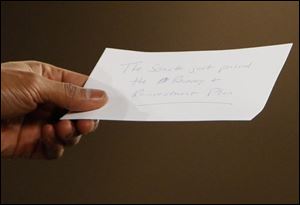
Senate passes stimulus; Treasury unveils bank help
2/10/2009
President Obama holds a note with the words 'The Senate just passed the Recovery and Reinvestment Plan,' in reference to the economic stimulus package, after it was passed to him by aide Reggie Love, not pictured, while Obama was on stage during a town hall meeting to discuss the economy Tuesday.
WASHINGTON The Senate approved President Barack Obama s giant economic stimulus measure on Tuesday, part of a string of powerful government steps that could marshal close to $3 trillion in taxpayer and private money to revive the collapsing national economy.
The 61-37 vote by the Senate was a key victory for the president but sets up difficult negotiations with the House, which passed a slightly different version than the $838 billion bill approved Tuesday.
Majority Leader Harry Reid, D-Nev., vowed to send a finished bill to Obama s desk as soon as possible.
Obama, who was in Fort Myers, Fla., promoting his economic rescue efforts, welcomed the vote as good news. ... It s a good start.
It came shortly after the Treasury Department and Federal Reserve moved to commit colossal sums of money to help thaw credit markets and slow layoffs that have left 3.6 million Americans unemployed.
It was a historic day of emergency federal action, but Wall Street didn t seem impressed. The Dow Jones industrials were down more than 300 points in afternoon trading.
Treasury Secretary Timothy Geithner outlined few details of how the Obama administration would spend the remaining $350 billion of the $700 billion bank bailout program started last fall under President George W. Bush.
He also announced a new public-private partnership to help strengthen banks.
Critical parts of our financial system are damaged, Geithner said. The financial system is working against recovery and that s the dangerous dynamic we need to change.
Added to the congressional stimulus plan, which aims to create jobs and get Americans spending again, the total of these combined efforts could easily pass $2 trillion.
Then, in a related government commitment of financial support, the Federal Reserve broadened a program designed to boost resources for consumer credit and small business loans from $200 billion to up to $1 trillion.
Obama kept up his dawn-to-dusk efforts to sell his new administration s rescue plan, flying to Fort Myers, Fla., a city especially hard hit by mortgage foreclosures.
I believe in hope, but I also believe in action, he told a town-hall meeting in Fort Myers.
Geithner s details on some aspects of the new plan were sparse. He said little about how the new public-private partnership would actually work to encourage hedge funds and other investors to buy toxic securities now clogging bank balance sheets.
Later, he told CNBC the administration wants to be careful to get this right.
For his part, Obama disclosed during his Florida appearance that I m going to be personally making an announcement in the next couple weeks what our overall housing strategy is going to be.
We ve got to provide some direct relief to homeowners, he added. His Florida visit came a day after he told his first prime-time news conference the nation s economic downturn had grown into a full-blown crisis.
In his speech announcing the new bailout plan, Geithner said it would lead to cleaner and stronger bank balance sheets by imposing tough new standards and using government and private incentives to get the banks lending again.
He said banks would be submitted to a stress test by government regulators to make sure they were healthy enough to lend before receiving additional financial aid.
In the Senate vote passing the stimulus bill, just three Republicans Susan Collins and Olympia Snowe of Maine and Arlen Specter of Pennsylvania joined 56 Democrats and two independents who align with Democrats in favor of the bill.
Obama s choice to be commerce secretary, Republican Sen. Judd Gregg of New Hampshire, did not vote, keeping his commitment not to participate in Senate business or votes while his confirmation is pending. All other Senate Republicans voted against the bill.
In the House, the legislation didn t get a single GOP vote.
The combined actions by the Treasury Department and the Fed were designed to unclog credit markets that provide loans to consumers and businesses.
The new Fed program to provide up to $1 trillion in lending, including loans for small businesses and for student, auto and other consumer loans, would be partially supported by a $100 billion contribution from the Treasury.
Federal Reserve Chairman Ben Bernanke told the House Financial Services Committee that the flurry of earlier radical programs taken by the Fed aimed at easing the credit crunch were showing promise.
Our lending to financial institutions, together with action taken by other agencies, has helped to relax the severe liquidity strains afflicting many banks, Bernanke said.